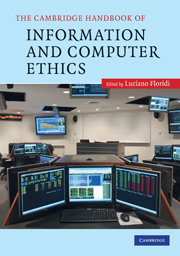The Cambridge Handbook of Information and Computer Ethics
Information and Communication Technologies (ICTs) have profoundly changed many aspects of life, including the nature of entertainment, work, communication, education, healthcare, industrial production and business, social relations and conflicts. They have had a radical and widespread impact on our moral lives and hence on contemporary ethical debates. The Cambridge Handbook of Information and Computer Ethics, first published in 2010, provides an ambitious and authoritative introduction to the field, with discussions of a range of topics including privacy, ownership, freedom of speech, responsibility, technological determinism, the digital divide, cyber warfare, and online pornography. It offers an accessible and thoughtful survey of the transformations brought about by ICTs and their implications for the future of human life and society, for the evaluation of behaviour, and for the evolution of moral values and rights. It will be a valuable book for all who are interested in the ethical aspects of the information society in which we live.
- Covers a wide range of issues regarding the ethics of information technology, with essays from leading scholars in the field
- Broadens from a purely philosophical approach to identifying the practical implications for those working in computer science
- Provides a clear introduction for students and does not assume any prior knowledge of the field
Reviews & endorsements
"...This five-part work examines difficulties in the field of information ethics and offers practical applications and criticisms... Recommended..."
--B. G. Turner, Faulkner University, CHOICE
"...This is a rich and fascinating book, bringing to interpretative debates much
that has been hitherto unknown. The chapters are long and complex, and the
argument is multidimensional and far-reaching."
--George Lăzăroiu, PhD, Institute of Interdisciplinary Studies in Humanities and Social Sciences, New York, Contemporary Readings in Law and Social Justice
Product details
May 2010Paperback
9780521717724
342 pages
247 × 174 × 16 mm
0.68kg
2 b/w illus. 3 tables
Available
Table of Contents
- Preface Luciano Floridi
- Part I. Introduction and Background:
- 1. Ethics after the information revolution Luciano Floridi
- 2. The historical roots of information and computer ethics Terrell Ward Bynum
- Part II. Ethical Approaches:
- 3. Values in technology and disclosive computer ethics Phil Brey
- 4. The use of normative theories in computer ethics Jeroen van den Hoven
- 5. Information ethics Luciano Floridi
- Part III. Ethical Issues in the Information Society:
- 6. Social issues in computer ethics Bernd Carsten Stahl
- 7. Rights and computer ethics John Sullins
- 8. Conflict, security and computer ethics John Arquilla
- 9. Personal values and computer ethics Alison Adam
- 10. Global information and computer ethics Charles Ess and May Thorseth
- 11. Computer ethics and applied contexts John Weckert and Adam Henschke
- Part IV. Ethical Issues in Artificial Contexts:
- 12. The ethics of IT artefacts Vincent Wiegel
- 13. Artificial life, artificial agents, virtual realities: technologies of autonomous agency Colin Allen
- 14. On new technologies Steve Clarke
- Part V. Metaethics:
- 15. The foundationalist debate in computer ethics Herman Tavani
- Epilogue: the ethics of the information society in a globalised world Luciano Floridi.




